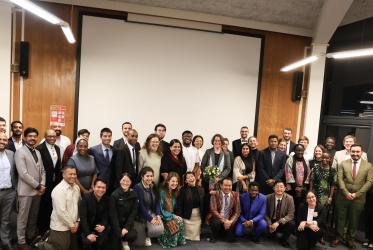This year the students come from Thailand, Indonesia, Madagascar, India, South Korea, Ukraine, and Serbia. Created specifically for the Bossey students, the course steadily strengthens the grammar base and draws on vocabulary and themes which the students are likely to encounter in their upcoming post-graduate ecumenical studies.
Wittawat Thamma, from the Church of Christ in Thailand, described the uniqueness of the English course: “For me this English course is so different from others. I could learn English anywhere,” Thamma said. “In Thailand we have a lot of English schools, but in this English course I not only get language skills but can learn how to communicate with others. It is not just language; it is also about sharing and discussing issues the ecumenical movement has.”
“English is very important for us, as it is the tool for our ecumenical movement. It is an opportunity for us to interact with others in our ecumenical journey,” explained Bohdan Mostovyi from the Ukrainian Orthodox Church. Manda Andrian from the Jakarta Theological Seminary affirms the same: “Most of us come to Bossey to study about either ecumenical or interfaith dialogue and, if we speak about dialogue, it's important to have a language to connect us.”
“Since the Ecumenical Institute at Bossey is a unique place, it would be a pity if we wouldn’t have a unique English course. Our theological studies will be specific so we need specific preparation,” reflected Zlatko Vujanović of the Serbian Orthodox Church.
These sentiments are echoed by Maria Laurence Chamamart Rodchompoo from the Roman Catholic Church in Thailand: “This English course has helped me to build my confidence; where I might not have felt confident enough to speak, I now do.”
Their teacher, Christine Housel, in her fourth summer of teaching for Bossey, affirms that the students each year are better equipped “to participate more fully and bring their voice to the conversation with more confidence.”
Completing the course becomes part of a toolbox for ecumenical formation and equips the students to operate academically in English throughout the post-graduate programmes, opening doors for Bossey students to further engage in ecumenical conversations and strengthen their journey.





